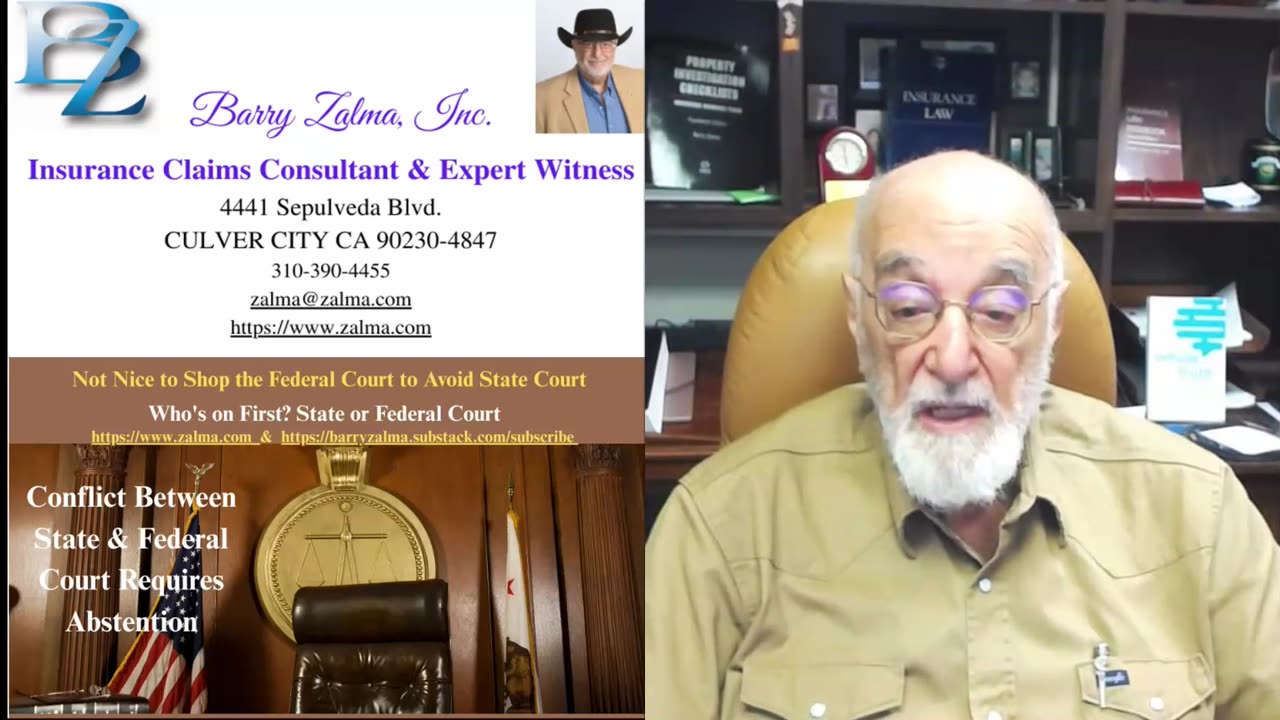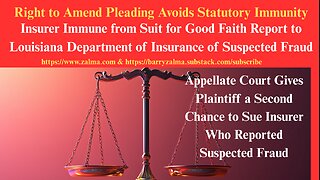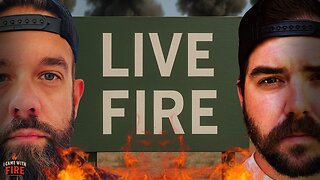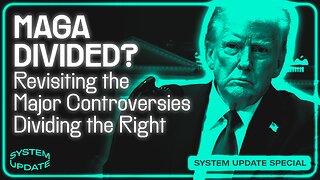Premium Only Content

Not Nice to Shop the Federal Court to Avoid State Court
Who's on First? State or Federal Court
Post 5222
Conflict Between State & Federal Court Requires Abstention
Hector David Campoverde was injured at a Brooklyn construction site in 2015. Campoverde was an employee of Vazquez Bro Restoration Inc., a subcontractor for C.C.C. Renovation Inc., which was itself a subcontractor for general contractor L&M Builders Group LLC. In Starr Indemnity & Liability Company v. Scottsdale Insurance Company, No. 24-CV-3309 (PKC) (TAM), United States District Court, E.D. New York (September 30, 2025) was asked to determine whether one or more of the involved insurers is obligated to indemnify Campoverde, and in what order Camporverde can receive indemnity, from one or more insurer.
Underlying Incident:
Campoverde and another plaintiff sued the property owners and L&M, alleging violations of New York Labor Law. Third-party complaints followed, involving C.C.C. and Vazquez Bro.
Insurance Coverage:
L&M’s primary insurer was Houston Casualty Company (“HCC”), with excess coverage provided by Starr. Scottsdale issued excess liability policies to C.C.C. for periods covering July 1, 2014–July 1, 2015, and October 13, 2015–June 30, 2016. Disputes arose over whether coverage was in effect at the time of the accident.
State Court Actions:
In 2022, C.C.C. and HCC filed consolidated actions in New York state court against Scottsdale and its agents, seeking declaratory judgment and damages regarding Scottsdale’s coverage obligations. The state court denied Scottsdale’s summary judgment motion, finding triable issues of fact regarding coverage. Scottsdale appealed, and the appeal is pending.
Federal Action:
On May 3, 2024, Starr filed a federal declaratory judgment action against Scottsdale, seeking declarations regarding coverage under the Scottsdale policies and claims of unjust enrichment.
Application of Law:
The court found significant overlap between the federal and state actions, with the core issue — Scottsdale’s coverage obligations — actively litigated in state court. Exercising federal jurisdiction risked contradictory findings and inefficiency, especially since state law issues predominated. Although Starr was not a party to the state action, its interests aligned with HCC, and the state court could resolve the key issues.
LEGAL STANDARD
The trial court was bound by several factors a court should consider when evaluating whether to abstain from hearing a claim for declaratory relief, including:
whether the declaratory judgment sought will serve a useful purpose in clarifying or settling the legal issues involved;
whether such a judgment would finalize the controversy and offer relief from uncertainty;
whether the proposed remedy is being used merely for procedural fencing or a race to res judicata;
whether the use of a declaratory judgment would increase friction between sovereign legal systems or improperly encroach on the domain of a state or foreign court;
whether there is a better or more effective remedy; and
whether concerns for judicial efficiency and judicial economy favor declining to exercise jurisdiction.
Abstention is Appropriate in this Matter
Because the underlying question of Scottsdale's coverage obligations is still unresolved in the State Court Action, the risk of potentially contradictory fact finding between the state and federal court on this critical issue means that entertaining jurisdiction in this action would not clarify or settle the legal issues involved.
The Court noted that the state court may come to differing conclusions as to whether Scottsdale had an insurance policy in effect on the date of the accident. The overlap indicates that this action may be an attempt at “procedural fencing or a race to res judicata,” and that exercising jurisdiction would “improperly encroach on the domain” of the state court,
The Court choose to stay, rather than dismiss, this action pending the resolution of the State Court Action. Therefore, Defendant's motion to dismiss was denied, but its request for a stay, in the alternative, was granted.
ZALMA OPINION
Federal Courts have limited jurisdiction and do not like it when a litigant brings an action in federal court to have a quick federal jurisdiction different than the decision eventually reached in the state court. The District court refused to be a party to legal and procedural shenanigans and stayed its case until after the conclusion of the state court so that there will be only one state of facts about the applicable insurance policies.
(c) 2025 Barry Zalma & ClaimSchool, Inc.
Please tell your friends and colleagues about this blog and the videos and let them subscribe to the blog and the videos.
Subscribe to my substack at https://barryzalma.substack.com/subscribe
Go to X @bzalma; Go to Barry Zalma videos at Rumble.com at https://rumble.com/account/content?type=all; Go to Barry Zalma on YouTube- https://www.youtube.com/channel/UCysiZklEtxZsSF9DfC0Expg; Go to the InsuranceClaims Library – https://lnkd.in/gwEYk.
-
 8:24
8:24
Insurance Law
10 days agoRight to Amend Pleading Avoids Statutory Immunity
171 -
 14:25
14:25
Tactical Advisor
12 hours agoReal Life John Wick Suit | Grayman & Company
3.84K1 -
 LIVE
LIVE
I_Came_With_Fire_Podcast
11 hours agoAlien Enemies Act | Dismantling the Department of Education | Valhalla VFT & America First
170 watching -
 19:53
19:53
MetatronHistory
2 hours agoRome VS Greece - Ultimate Clash of Civilizations Explained
1.26K -
 33:09
33:09
Exploring With Nug
4 hours ago $2.81 earnedThey Weren’t Ready for Nightfall on Blood Mountain… So I Helped Them Down
21K1 -
 1:16:42
1:16:42
Sarah Westall
3 hours agoBoardroom and Government Infiltration: The Silent Erosion of American Power w/ Mike Harris
11.6K1 -
 LIVE
LIVE
JahBlessCreates
1 hour ago🎉WE BACK!! MUSIC | VIBES | GAMES
38 watching -
![R.E.D FRIDAY!! TIME FOR WAR! [RGMT CONTENT Mgr. | RGMT GL | GZW CL]](https://1a-1791.com/video/fwe2/cb/s8/1/c/f/6/B/cf6Bz.0kob-small-R.E.D-FRIDAY-TIME-FOR-WAR-R.jpg) LIVE
LIVE
XDDX_HiTower
1 hour agoR.E.D FRIDAY!! TIME FOR WAR! [RGMT CONTENT Mgr. | RGMT GL | GZW CL]
12 watching -
 LIVE
LIVE
Cewpins
1 hour agoFRIDAY CrossFade PARTY!!🔥weed + dabs + prosecco🍃420💨!MJ
43 watching -
 1:03:56
1:03:56
Glenn Greenwald
5 hours agoIs MAGA Divided? Revisiting the Major Controversies on the Right
96.8K37